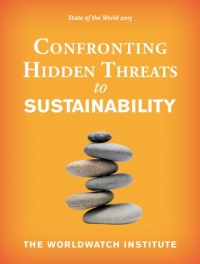Confronting Hidden Threats to Sustainability
"Human ingenuity has fashioned technically advanced societies and maximized the production of goods and services. Our economic systems are programmed to squeeze ever more resources from a planet increasingly in distress—whether it be more oil and gas from underground deposits, more milk from a cow, or more economic surplus from the human workforce. Although the discussion of political systems often revolves around lofty ideas like freedom, democracy, and different forms of representation, at base, they are engineered to support the process of maximizing material throughput. But this success has come at the expense of weakened biological diversity and compromised natural systems. And it is the result of a relatively narrow U.S. Army technicians set up an assay for Ebola in a containment laboratory. Randal J. Schoepp he Seeds of Modern Threats | 17 set of factors and circumstances, ranging from natural conditions to human institutions. Yet these very circumstances could one day be swept away by the severe shocks that a destabilized climate entails, putting in question the ability of societies not just to thrive, but to adapt and possibly even survive. This is especially the case if societies fail to recognize hidden threats in a timely manner. The very pillars of contemporary success—among them, high degrees of specialization, complexity, and manifold interconnections—could very well turn out to be humanity’s Achilles heel. Specialization works well only within certain tightly controlled parameters, but it could be useless under changed circumstances. Complexity and interconnections multiply the strengths and advantages of a viable system, but they also make it susceptible to a rapid cascade of destabilizing impacts. Such a highly productive system is actually low on resilience because it focuses on constantly reducing any slack or redundancy—the exact features that allow for resilience to materialize. Author Thomas Homer-Dixon quotes Buzz Holling, a leading Canadian ecologist, who has warned that the longer a system is locked onto a trajectory of unsustainable growth, “the greater its vulnerability and the bigger and more dramatic its collapse will be.”32 Seen through this broader lens, it is clear that the challenge for humanity today is no longer anything like what it faced in the 1960s and 1970s, when developing pollution abatement technologies and lessening the degree to which resources were wasted provided a more-or-less adequate answer to the most pressing problems of the day. The world now needs to adopt solutions that change the entire system of production and consumption in a fundamental manner, that move societies from conditions of energy and materials surplus to scarcity, and that develop the foresight needed to recognize still-hidden threats to sustainability. This goes far beyond the realm of technical adaptations, and instead requires large-scale social, economic, and political engineering—in an effort to create the foundations for a more sustainable human civilization."
Quelle: Michael Renner, Auszug aus dem 1. Kapitel
State of the World 2015 - Confronting Hidden Threats to Sustainability
http://www.worldwatch.org/system/files/SOTW%20intro.pdf




